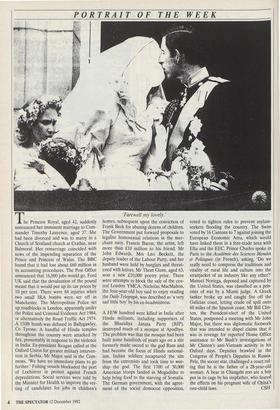PORTRAIT OF THE WEEK
`Farewell my lovely.'
he Princess Royal, aged 42, suddenly announced her imminent marriage to Com- mander Timothy Laurence, aged 37. She had been divorced and was to marry in a Church of Scotland church at Crathie, near Balmoral. Her remarriage coincided with news of the impending separation of the Prince and Princess of Wales. The BBC found that it had lost about £60 million in its accounting procedures. The Post Office announced that 16,000 jobs would go. Ford UK said that the devaluation of the pound meant that it would put up its car prices by 10 per cent. There were 64 injuries when two small IRA bombs were set off in Manchester. The Metropolitan Police set up roadblocks in London, apparently under the Police and Criminal Evidence Act 1984, or alternatively the Road Traffic Act 1974. A 1501b bomb was defused in Ballygawley, Co Tyrone. A handful of Hindu temples throughout the country were attacked by fire, presumably in response to the violence in India. Ex-president Reagan called at the Oxford Union for greater military interven- tion in Serbia. Mr Major said in the Com- mons, 'We have no immediate plans to go further.' Fishing vessels blockaded the port of Lochinver in protest against French depredations. Social services were told by the Minister for Health to improve the vet- ting of candidates for jobs in children's homes, subsequent upon the conviction of Frank Beck for abusing dozens of children. The Government put forward proposals to legalise homosexual relations in the mer- chant navy. Francis Bacon, the artist, left more than £10 million to his friend, Mr John Edwards. Mrs Leo Beckett, the deputy leader of the Labour Party, and her husband were held by burglars and threat- ened with knives. Mr Thom Gunn, aged 63, won a new £10,000 poetry prize. There were attempts to block the sale of the cen- tral London YMCA. Nicholas MacMahon, the four-year-old boy said to enjoy reading the Daily Telegraph, was described as 'a very sad little boy' by his ex-headmistress.
A FEW hundred were killed in India after Hindu militants, including supporters of the Bharidiya Janata Party (BJP), destroyed much of a mosque at Ayodhya. The problem was that the mosque had been built some hundreds of years ago on a site formerly made sacred to the god Ram and had become the focus of Hindu national- ism. Indian soldiers recaptured the site from the extremists and took time to wor- ship the god. The first 1700 of 30,000 American troops landed in Mogadishu to help bring food to the starving of Somalia. The German government, with the agree- ment of the social democrat opposition, voted to tighten rules to prevent asylum- seekers flooding the country. The Swiss voted by 16 Cantons to 7 against joining the European Economic Area, which would have linked them in a free-trade area with Efta and the EEC. Prince Charles spoke in Paris to the Academie des Sciences Morales et Politiques (in French), asking, 'Do we really need to compress the traditions and vitality of rural life and culture into the straitjacket of an industry like any other?' Manuel Noriega, deposed and captured by the United States, was classified as a pris- oner of war by a Miami judge. A Greek tanker broke up and caught fire off the Galician coast, letting crude oil spill onto 60 miles of the Spanish coast. Mr Bill Clin- ton, the President-elect of the United States, postponed a meeting with Mr John Major, but there was diplomatic footwork that was intended to dispel claims that it was in revenge for reported Home Office assistance to Mr Bush's investigations of Mr Clinton's anti-Vietnam activity in his Oxford days. Deputies brawled in the Congress of People's Deputies in Russia. Pele, the soccer star, challenged a court ril- ing that he is the father of a 28-year-old woman. A bear in Changzhi zoo ate a boy put in its cage by his stepfather, who feared the effects on his pregnant wife of China's


































































 Previous page
Previous page